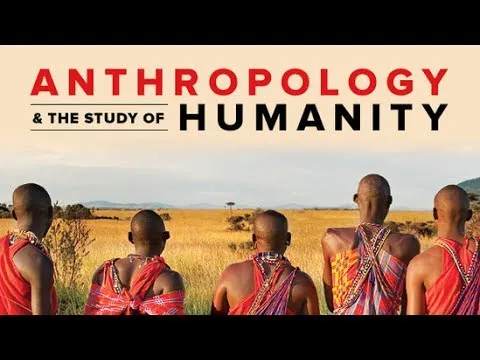
Anthropology and the Question of Race Wondrium 
Get a comprehesive understanding of Anthropology and the Question of Race Wondrium. This is a free course from Youtube. AZ Class provides this course data for free. Learn more certificate and details here. Discover the fascinating world of anthropology and unravel the complexities of race with this captivating course from Wondrium. Delve into the history of Social Darwinism and witness how renowned anthropologists like Franz Boas revolutionized their understanding of race as a cultural construct, separate from biology and geography. Explore thought-provoking topics such as health inequalities, the persistence of the myth of multiple human races, and the influence of their origins on their perception of race. Start your free trial now and gain access to thousands of courses, documentaries, and more on Wondrium. Subscribe to their channel for new videos and expand your knowledge today! ▼
ADVERTISEMENT
Course Feature
![]() Cost:
Cost:
Free
![]() Provider:
Provider:
Youtube
![]() Certificate:
Certificate:
No Information
![]() Language:
Language:
English
![]() Start Date:
Start Date:
2017-06-23 00:00:00
Course Overview
❗The content presented here is sourced directly from Youtube platform. For comprehensive course details, including enrollment information, simply click on the 'Go to class' link on our website.
Updated in [October 07th, 2023]
Want to stream more content like this… and 1,000’s of courses, documentaries & more? Start Your Free Trial of Wondrium - Unpack the ambiguities around race, skin color, and biology. After reviewing the history of Social Darwinism, you’ll see how Franz Boas and other 20th century anthropologists shifted our understanding of race to show how it is a cultural construct, independent of biology and geography. 00:00 Is There Truly Only One Race—the Human Race? 02:08 Charles Orser: How Archaeologists Confuse Race 03:21 How Social Darwinism Spread 06:53 "White Man's Burden" and Imperialism 10:25 Eugenics Creed Leads to Sterilization 12:13 Darwin's Cousin Francis Galton Champions Eugenics 13:34 Oliver Wendell Holmes Endorses Eugenics 14:11 How Did We Get Past Social Darwinism? 15:47 Franz Boas Moves Beyond Biological Determinism 17:23 Defining Cultural Relativity 18:54 Why Does the Myth of Multiple Human Races Persist? 22:34 Understanding Health Inequalities 26:12 US Census Bureau Clarifies Use of Racial Categories 27:04 How Our Origins Inform Our Understanding of Race This free lecture comes from the course Anthropology and the Study of Humanity. Learn more about this course and start your FREE trial of The Great Courses Plus here: Don’t forget to subscribe to our channel – we are adding new videos all the time!
Course Provider

Provider Youtube's Stats at AZClass
We considered the value of this course from many aspects, and finally summarized it for you from two aspects: skills and knowledge, and the people who benefit from it:
(Please note that our content is optimized through artificial intelligence tools and carefully reviewed by our editorial staff.)
What skills and knowledge will you acquire during this course?
During the course "Anthropology and the Question of Race" on Wondrium, learners will acquire the following skills and knowledge:
1. Understanding the history of Social Darwinism and its impact on the concept of race.
2. Exploring the cultural construct of race and its independence from biology and geography.
3. Examining the role of Franz Boas and other 20th-century anthropologists in shifting their understanding of race.
4. Analyzing the ambiguities surrounding race, skin color, and biology.
5. Recognizing the influence of imperialism and the "White Man's Burden" ideology on racial perceptions.
6. Investigating the eugenics movement and its impact on sterilization practices.
7. Exploring the contributions of Francis Galton and Oliver Wendell Holmes to the promotion of eugenics.
8. Understanding how society moved past Social Darwinism and embraced a more nuanced understanding of race.
9. Defining cultural relativity and its significance in understanding race.
10. Examining the persistence of the myth of multiple human races and its implications.
11. Understanding health inequalities and their connection to race.
12. Exploring the use of racial categories by the US Census Bureau.
13. Analyzing how their origins inform their understanding of race.
By completing this course, learners will gain a comprehensive understanding of the complexities and misconceptions surrounding the concept of race, as well as the historical and cultural factors that have shaped their understanding of it.
Who will benefit from this course?
This course on Anthropology and the Question of Race will benefit individuals who are interested in understanding the complexities and misconceptions surrounding race, skin color, and biology. It is particularly relevant for:
1. Anthropology students and researchers: The course delves into the history of social Darwinism and the contributions of anthropologists like Franz Boas, providing a comprehensive understanding of race as a cultural construct. This knowledge is essential for those studying or working in the field of anthropology.
2. Educators and teachers: The course offers valuable insights into the history of race and the debunking of biological determinism. Educators can use this knowledge to teach their students about the social and cultural aspects of race, promoting a more inclusive and informed understanding.
3. Social scientists and researchers: The course explores the persistence of the myth of multiple human races and the impact of race on health inequalities. Social scientists and researchers can benefit from this course by gaining a deeper understanding of the social, cultural, and historical factors that shape race and its implications in various contexts.
4. Individuals interested in social justice and equality: By unpacking the ambiguities around race, this course helps individuals develop a more nuanced understanding of race as a social construct. This knowledge can contribute to discussions and actions aimed at promoting social justice, equality, and the dismantling of racial stereotypes and biases.
Discussion and Reviews
0.0 (Based on 0 reviews)
Explore Similar Online Courses

Revit Course for Beginners : Revit Tutorials to Learn BIM Fast Part 1 - Setup

Becoming a BIM Specialist : Neha Sadruddin (Grimshaw Architects)

Python for Informatics: Exploring Information

Social Network Analysis

Introduction to Systematic Review and Meta-Analysis

The Analytics Edge

DCO042 - Python For Informatics

Causal Diagrams: Draw Your Assumptions Before Your Conclusions

Whole genome sequencing of bacterial genomes - tools and applications

Exploring The Arts Through Cultural Anthropology

Anthropology Origins Homo sapiens


Start your review of Anthropology and the Question of Race Wondrium